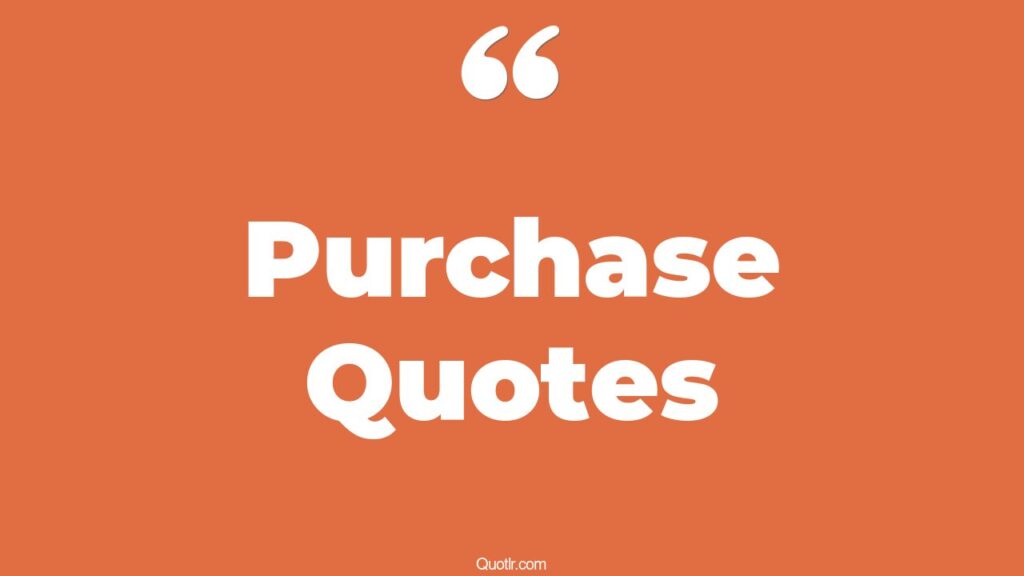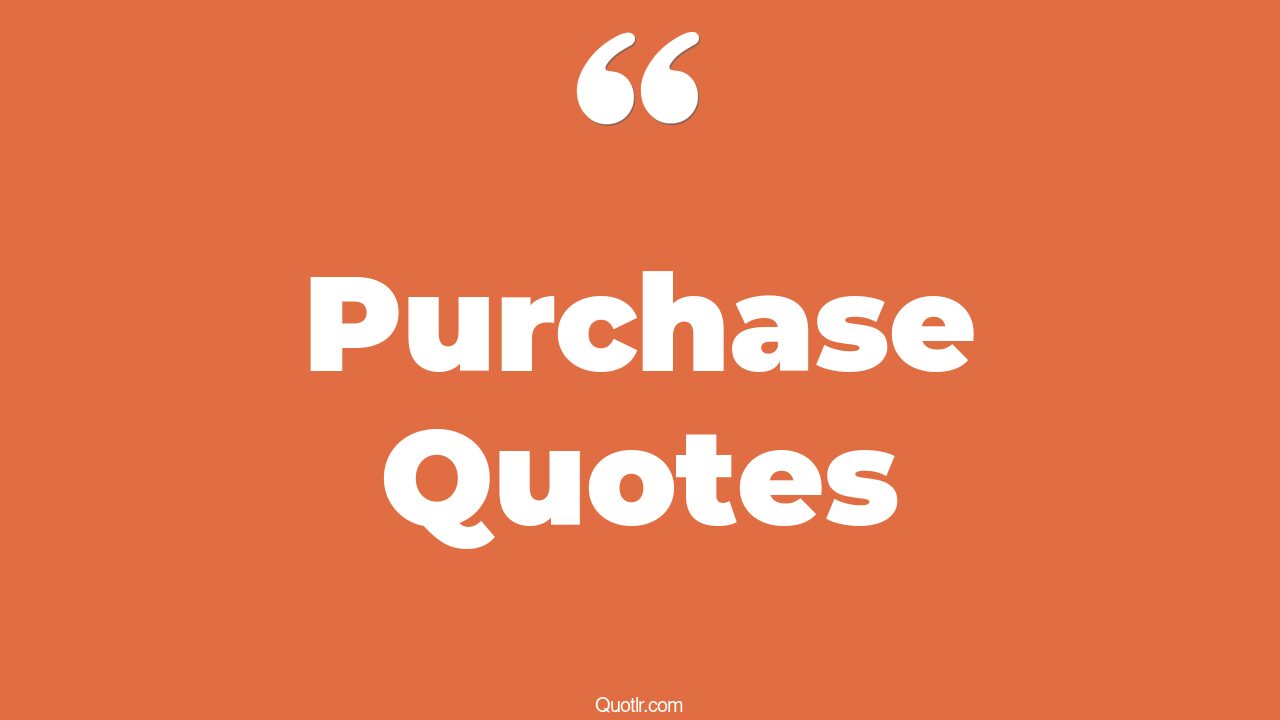
Navigating the Complexities of a Purchase Quote: A Comprehensive Guide
In the intricate dance of commerce, the purchase quote stands as a pivotal figure. It’s more than just a piece of paper or a digital document; it’s the genesis of a potential transaction, a promise of value exchanged for a specified sum. Understanding the nuances of a purchase quote is crucial for both buyers and sellers, ensuring clarity, fairness, and ultimately, a successful business relationship. This comprehensive guide delves into the depths of the purchase quote, dissecting its components, its significance, and how to navigate its intricacies with confidence.
Decoding the Purchase Quote: What’s Inside?
At its core, a purchase quote is a legally binding offer to sell goods or services at a specified price. It serves as a formal proposal, outlining the terms of the transaction. A well-structured purchase quote typically includes the following essential elements:
- Seller Information: This section identifies the vendor, including their name, address, contact details, and often their business registration number.
- Buyer Information: Similarly, the purchase quote should clearly identify the prospective buyer, including their name, address, and contact information.
- Quote Number and Date: A unique identifier and the date of issue are essential for tracking and referencing the purchase quote.
- Description of Goods or Services: A detailed description of what is being offered, including specifications, quantities, and any relevant details. This is perhaps the most critical aspect, as it defines the scope of the transaction.
- Price: The price of each item or service, along with the total cost. This should include any applicable taxes, discounts, and shipping or handling fees.
- Payment Terms: The agreed-upon payment schedule, including the method of payment, due dates, and any penalties for late payments.
- Validity Period: The length of time the purchase quote is valid. After this date, the offer may be subject to change.
- Terms and Conditions: Any additional terms and conditions that govern the transaction, such as warranty information, return policies, and liability clauses.
A comprehensive purchase quote is a sign of professionalism and attention to detail. It protects both the buyer and the seller, minimizing the potential for misunderstandings and disputes.
The Buyer’s Perspective: Evaluating a Purchase Quote
For a buyer, the purchase quote is a critical decision-making tool. It allows them to evaluate different options, compare prices, and assess the overall value proposition. Here’s how buyers should approach the evaluation process:
- Scrutinize the Details: Carefully review each element of the purchase quote, paying close attention to the description of goods or services, the price, and the payment terms. Ensure that everything aligns with their requirements and expectations.
- Compare Quotes: If possible, obtain multiple purchase quotes from different vendors. This allows for a direct comparison of pricing, quality, and terms, enabling the buyer to make an informed decision.
- Assess the Vendor: Research the vendor’s reputation, experience, and customer reviews. This helps gauge the vendor’s reliability and their ability to deliver on their promises.
- Negotiate Terms: Don’t be afraid to negotiate. Buyers can often negotiate better prices, payment terms, or other aspects of the purchase quote.
- Consider the Total Cost of Ownership: Look beyond the initial price and consider the long-term costs, such as maintenance, repairs, and potential upgrades.
A thorough evaluation process ensures that the buyer secures the best possible deal while minimizing risks.
The Seller’s Perspective: Crafting a Compelling Purchase Quote
For sellers, the purchase quote is a crucial sales tool. It’s their opportunity to showcase their products or services and persuade the buyer to choose them. Here’s how sellers can craft a compelling purchase quote:
- Be Accurate and Detailed: Provide a clear, accurate, and detailed description of the goods or services. Avoid vague language and provide specific details to avoid any ambiguity.
- Be Competitive: Research the market and offer competitive pricing. While price isn’t everything, it’s a significant factor in the buyer’s decision.
- Highlight Value: Emphasize the value proposition of your offering. Explain the benefits of your products or services and how they meet the buyer’s needs.
- Be Professional: Present the purchase quote in a professional and well-organized manner. Use clear and concise language and ensure that the document is free of errors.
- Follow Up: Don’t just send the purchase quote and wait. Follow up with the buyer to answer any questions and address any concerns.
A well-crafted purchase quote is a powerful tool for winning business and building strong customer relationships.
Common Pitfalls and How to Avoid Them
Both buyers and sellers can fall into common pitfalls when dealing with purchase quotes. Avoiding these pitfalls can help ensure a smooth and successful transaction:
- Ambiguity: Vague or unclear language can lead to misunderstandings and disputes. Ensure that all terms and conditions are clearly defined and understood.
- Incomplete Information: Failing to provide all the necessary information can delay the transaction or lead to errors. Ensure that all required fields are completed accurately.
- Ignoring the Fine Print: Buyers and sellers should carefully review all terms and conditions before agreeing to the purchase quote.
- Lack of Communication: Poor communication can lead to misunderstandings and delays. Maintain open and consistent communication throughout the process.
- Failing to Update: Ensure that the purchase quote reflects the latest pricing, product availability, and terms.
By being mindful of these pitfalls, both parties can minimize risks and ensure a positive outcome.
The Legal Implications of a Purchase Quote
A purchase quote is often considered a legally binding offer. Once the buyer accepts the purchase quote, it typically forms the basis of a contract. This means both the buyer and the seller are legally obligated to fulfill their respective obligations. Therefore, it’s crucial to understand the legal implications of a purchase quote.
The specific legal requirements for a purchase quote to be considered a valid contract can vary depending on jurisdiction. However, generally, a valid contract requires:
- Offer: The purchase quote itself constitutes the offer.
- Acceptance: The buyer’s acceptance of the purchase quote, typically in writing or through a purchase order.
- Consideration: Something of value exchanged between the parties (e.g., goods/services for money).
- Intent to Create Legal Relations: The parties must intend to create a legally binding agreement.
It’s always advisable to seek legal counsel if you have questions or concerns about the legal implications of a purchase quote, particularly for large or complex transactions.
Leveraging Technology for Efficient Purchase Quotes
Technology has revolutionized the way businesses handle purchase quotes. Various software solutions and online tools can streamline the process, saving time and improving accuracy. These tools often offer features such as:
- Automated Quote Generation: Quickly create professional purchase quotes with pre-defined templates and data.
- Customization: Easily customize purchase quotes to match your branding and specific requirements.
- Tracking and Management: Track the status of purchase quotes, manage approvals, and monitor sales pipelines.
- Integration: Integrate with other business systems, such as CRM and accounting software.
- E-signatures: Enable electronic signatures for faster and more convenient approvals.
By leveraging technology, businesses can improve efficiency, reduce errors, and enhance the overall customer experience. The automation of the purchase quote process frees up valuable time for sales teams to focus on closing deals and building relationships. The ability to quickly generate and customize quotes allows for faster response times, giving businesses a competitive edge. Furthermore, integrated systems provide a centralized view of all quote-related activities, facilitating better decision-making and improved sales forecasting. The use of e-signatures streamlines the approval process, enabling faster turnaround times and reducing the need for paper-based documentation.
Beyond the Basics: Advanced Considerations for Purchase Quotes
While the core elements of a purchase quote remain constant, there are advanced considerations that may apply depending on the nature of the transaction. These include:
- International Trade: For international transactions, purchase quotes must comply with international trade regulations and Incoterms (International Commercial Terms).
- Government Contracts: Government contracts often have specific requirements for purchase quotes, including compliance with procurement regulations.
- Complex Projects: For complex projects, purchase quotes may include detailed project plans, timelines, and milestones.
- Service Agreements: Purchase quotes for services may include service level agreements (SLAs) that define performance standards.
- Change Orders: Mechanisms for handling changes to the original purchase quote, such as change orders, should be clearly defined.
Understanding these advanced considerations is crucial for ensuring successful outcomes in specialized situations. The complexities of international trade require meticulous attention to detail, including compliance with import/export regulations, customs procedures, and currency exchange rates. When dealing with government contracts, adherence to procurement guidelines and regulations is paramount. Complex projects demand detailed project plans, timelines, and milestones to ensure that the project stays on track and within budget. Service level agreements (SLAs) in service agreements establish clear performance standards and expectations for both parties. Finally, incorporating mechanisms for change orders allows for flexibility and adaptability when unexpected modifications arise during the course of a project or service.
Conclusion: Mastering the Art of the Purchase Quote
The purchase quote is a fundamental element of business transactions. By understanding its components, significance, and the potential pitfalls, both buyers and sellers can navigate the process with confidence. From the initial offer to the final agreement, the purchase quote lays the foundation for a successful business relationship. Mastering the art of the purchase quote is not just about creating a document; it’s about building trust, fostering transparency, and ultimately, driving business growth. The ability to craft a clear, accurate, and compelling purchase quote is a valuable skill for any business professional. By embracing technology, staying informed about legal implications, and considering advanced scenarios, businesses can further optimize their purchase quote processes and achieve greater success.
The purchase quote, when handled correctly, is a powerful tool that can facilitate smooth transactions and build long-lasting relationships. [See also: How to Negotiate a Better Price, Contract Law Basics, Choosing the Right Vendor]


